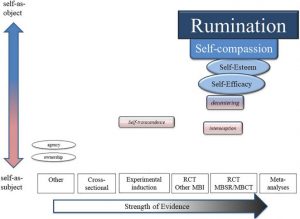Mindfulness May Produce Its Benefits by Improving Self-Related Processes
By John M. de Castro, Ph.D.
“Mindful people might be happier because they have a better idea of who they are.” – Kira M. Newman
“Meditation leads to concentration, concentration leads to understanding, and understanding leads to happiness” – This wonderful quote from the modern-day sage Thich Nhat Hahn is a beautiful pithy description of the benefits of mindfulness practice. Mindfulness allows us to view our experience and not put labels on it, not make assumptions about it, not relate it to past experiences, and not project it into the future. Rather mindfulness lets us experience everything around and within us exactly as it is arising and falling away from moment to moment including the self and psychological processes related to the self.
mindfulness training has been shown to increase psychological well-being and happiness and help to relieve mental illness. A number of mechanisms of how mindfulness produces these benefits have been proposed. Many of the proposed mechanisms involve self-relate processes which require “one to evaluate or judge some feature in relation to one’s perceptual image or mental concept of oneself,” such as self-efficacy, decentering, and self-regulation. There has accumulated a large volume of research. So, it is important to examine the findings and what has been learned.
In today’s Research News article “From Self-Esteem to Selflessness: An Evidence (Gap) Map of Self-Related Processes as Mechanisms of Mindfulness-Based Interventions.” (See summary below or view the full text of the study at: https://www.ncbi.nlm.nih.gov/pmc/articles/PMC8645694/ ) Britton and colleagues review and summarize the published research on the role of self-related processes in the beneficial effects of mindfulness-based interventions. They examine 3 categories of self-related processes, self-regulation skills, and embodied self-regulation processes.
They report that the published research found that alterations self-related processes in part mediate the beneficial effects of mindfulness-based interventions. These include reductions in negative self-evaluations including rumination and dysfunctional attitudes and increases in positive self-evaluations including self-compassion and self-esteem. Self-regulation skills also appear in part to mediate the beneficial effects of mindfulness-based interventions. These include increases in self-efficacy and decentering. Finally, embodied self-regulation processes appear in co-occur with the beneficial effects of mindfulness-based interventions but have not been conclusively established as mediators. These include increases in interoception, selflessness, and self-transcendence.
These findings suggest that mindfulness-based interventions produce beneficial effects by at least in part altering how the individual views and processes ideas of the self. Mindfulness training involves focusing on the present moment and this focus may reduce the influence of the past and projections of the future on the individual’s psychological well-being. Most negative views of the self are past and future based. So, mindfulness training may improve the ideas of self by focusing on the present and seeing the self as processes occurring in the now, a more grounded and realistic view of the self. Obviously more research is needed on this promising area of potential mindfulness mediators.
So, mindfulness may produce its benefits by improving self-related processes.
“[Mindfulness] encourages people to simply observe the contents of their mind. In this way, I think that mindfulness allows for greater self-insight.” – Rimma Tepper
CMCS – Center for Mindfulness and Contemplative Studies
This and other Contemplative Studies posts are available on Twitter @MindfulResearch
Study Summary
Britton, W. B., Desbordes, G., Acabchuk, R., Peters, S., Lindahl, J. R., Canby, N. K., Vago, D. R., Dumais, T., Lipsky, J., Kimmel, H., Sager, L., Rahrig, H., Cheaito, A., Acero, P., Scharf, J., Lazar, S. W., Schuman-Olivier, Z., Ferrer, R., & Moitra, E. (2021). From Self-Esteem to Selflessness: An Evidence (Gap) Map of Self-Related Processes as Mechanisms of Mindfulness-Based Interventions. Frontiers in psychology, 12, 730972. https://doi.org/10.3389/fpsyg.2021.730972
Abstract
Self-related processes (SRPs) have been theorized as key mechanisms of mindfulness-based interventions (MBIs), but the evidence supporting these theories is currently unclear. This evidence map introduces a comprehensive framework for different types of SRPs, and how they are theorized to function as mechanisms of MBIs (target identification). The evidence map then assesses SRP target engagement by mindfulness training and the relationship between target engagement and outcomes (target validation). Discussion of the measurement of SRPs is also included. The most common SRPs measured and engaged by standard MBIs represented valenced evaluations of self-concept, including rumination, self-compassion, self-efficacy, and self-esteem. Rumination showed the strongest evidence as a mechanism for depression, with other physical and mental health outcomes also supported. Self-compassion showed consistent target engagement but was inconsistently related to improved outcomes. Decentering and interoception are emerging potential mechanisms, but their construct validity and different subcomponents are still in development. While some embodied self-specifying processes are being measured in cross-sectional and meditation induction studies, very few have been assessed in MBIs. The SRPs with the strongest mechanistic support represent positive and negative evaluations of self-concept. In sum, few SRPs have been measured in MBIs, and additional research using well-validated measures is needed to clarify their role as mechanisms.
https://www.ncbi.nlm.nih.gov/pmc/articles/PMC8645694/
